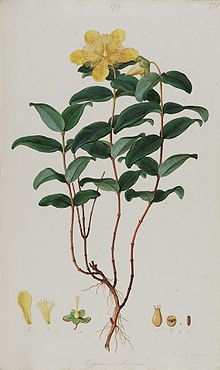Hypericum calycinum
| Hypericum calycinum | |
|---|---|
 |
|
| Bauer's Illustration from Sibthorp's Flora Graeca | |
| Scientific classification | |
| Kingdom: | Plantae |
| (unranked): | Angiosperms |
| (unranked): | Eudicots |
| (unranked): | Rosids |
| Order: | Malpighiales |
| Family: | Hypericaceae |
| Genus: | Hypericum |
| Species: | H. calycinum |
| Binomial name | |
|
Hypericum calycinum L. |
|
Hypericum calycinum is a species of prostrate or low-growing shrub in the flowering plant family Hypericaceae. Widely cultivated for its large yellow flowers, its names as a garden plant include Rose-of-Sharon in Britain and Australia, and Aaron's beard, Great St-John's wort, and Jerusalem star. Grown in Mediterranean climates, widely spread in the Strandja Mountains along the Bulgarian and Turkish Black Sea coast.
It is a low, creeping, woody shrub to about 1 m tall and 1–2 m wide but often smaller. The green, ovate leaves grow in opposite pairs. The solitary flowers are 3–5 cm in diameter, a rich yellow, with five petals and numerous yellow stamens. It is indigenous to southeast Europe and southwest Asia. It is a popular, semi-evergreen garden shrub with many named cultivars and hybrids derived from it.
In North America the name Rose of Sharon is applied to a species in a different order, Hibiscus syriacus.
This species is capable of producing the same medicinally active components as H. perforatum (hyperforin etc.), though in different ratios, with adhyperforin predominating, and a low level of hyperforin present.
...
Wikipedia
